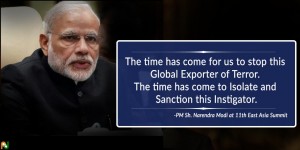 Prime Minister Narendra Modi has given a new twist to Islamabad’s trade balance with the world, telling the international community with a straight face that Pakistan’s sole competitive advantage lies in exporting terror.
Prime Minister Narendra Modi has given a new twist to Islamabad’s trade balance with the world, telling the international community with a straight face that Pakistan’s sole competitive advantage lies in exporting terror.
Mr Modi’s unstinting indictment of Pakistan at two back-to-back multilateral summits has taken many by surprise. His remarks at the G20 summit in China and East Asia Summit in Laos, singling out Pakistan’s “sponsorship and export of terror,” were part of an “offensive defence” strategy designed to put a belligerent Islamabad under stress.
It’s time to sanction Pakistan: Modi
On the concluding day of the G20 summit in Hangzhou, (China) on September 5, Mr Modi told the leaders of the world’s most powerful economies that one nation was spreading agents of terror in the region. “Those who sponsor and support terrorism must be isolated and sanctioned, not rewarded,” he had said.
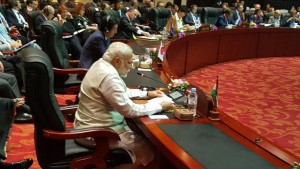 Three days later, in front of the 17 leaders of the East Asia Summit in Vientiane, Mr Modi once again took on Pakistan without naming it, saying it was time to isolate and sanction ‘this’ instigator (of terrorism). “‘One country’ in our neighbourhood, whose competitive advantage rests solely in producing and exporting terrorism… The time has come to isolate and sanction ‘this’ instigator,” he said.
Three days later, in front of the 17 leaders of the East Asia Summit in Vientiane, Mr Modi once again took on Pakistan without naming it, saying it was time to isolate and sanction ‘this’ instigator (of terrorism). “‘One country’ in our neighbourhood, whose competitive advantage rests solely in producing and exporting terrorism… The time has come to isolate and sanction ‘this’ instigator,” he said.
Rallying the international community against the common scourge of terrorism, the Indian leader underlined that there was a need to target not only terrorists but also their entire supporting ecosystem.
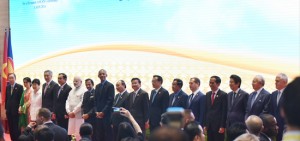 “Terrorism is most serious challenge to open & pluralistic societies. Combating it requires collective effort. We need to target not only the terrorists but also their entire supporting ecosystem. Our strongest action should be reserved for those state actors who employ terrorism as an instrument of State Policy,” he said.
“Terrorism is most serious challenge to open & pluralistic societies. Combating it requires collective effort. We need to target not only the terrorists but also their entire supporting ecosystem. Our strongest action should be reserved for those state actors who employ terrorism as an instrument of State Policy,” he said.
Behind Pakistan-bashing: It’s the K word
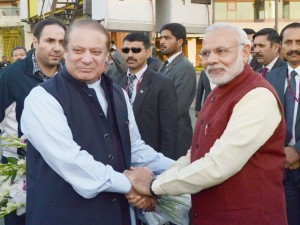 Why has Mr Modi, who started his stint in power by inviting Pakistan’s Prime Minister Nawaz Sharif, along with other SAARC leaders, for his swearing-in ceremony in New Delhi, and followed it up with a surprise trip to Lahore in December last year, has turned up the heat on Islamabad?
Why has Mr Modi, who started his stint in power by inviting Pakistan’s Prime Minister Nawaz Sharif, along with other SAARC leaders, for his swearing-in ceremony in New Delhi, and followed it up with a surprise trip to Lahore in December last year, has turned up the heat on Islamabad?
There is no point in indulging in esoteric speculation; one does not have to look far for reasons for Mr Modi’s vehement Pakistan-bashing. It’s clearly a sense of betrayal and promises not kept. Mr Modi has gambled hard on achieving rapprochement with Pakistan, and if any proof was needed of his sincerity, his impromptu trip to Lahore to partake in the family festivities of Mr Sharif should silence sceptics.
But his gambit has not worked as Pakistan has failed to honour its part of the bargain; instead, barely a few days after Mr Modi’s so-called historic trip to Lahore, Pakistani militants struck at the Pathankot airbase. Nawaz Sharif showed a hint of sincerity by promising to probe the Pathankot attack, but soon after the accident-prone India-Pakistan relations got bogged down in mutual recriminations.
To New Delhi’s dismay, Mr Sharif turned a hawk, and under pressure from the military establishment, decided to openly declare support for insurgents in Kashmir by declaring the charismatic Hizbul commander Burhan Wani a martyr. What followed was along predictable lines, with Pakistan seizing the opportunity to internationalise the Kashmir issue and raising the pitch on alleged human rights violations in Jammu and Kashmir.
Balochistan gambit
But in doing so, Pakistan’s rulers failed to anticipate a radical shift in Mr Modi’s policy when he hit back by highlighting human rights violations in Pakistan-Occupied Kashmir and Gilgit-Baltistan. He pushed the envelope further by also mentioning Balochistan in his Independence Day speech, widely seen as a paradigm shift signalling a new muscular hawkish policy by PM Modi vis-à-vis Pakistan.
The Way Ahead
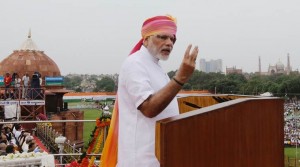
The battle has been joined now, and having upped the ante, Mr Modi looks set to intensify pressure over Islamabad in days to come. With Nawaz Sharif announcing his decision to send 22 MPs as special envoys to key world capitals to highlight human rights abuses in Jammu and Kashmir, Mr Modi is doing what is expected of an Indian leader, especially by his hardline nationalist constituency.
As he is not going to the United Nations General Assembly (UNGA) this year, PM Modi has leveraged the two multilateral summits to expose Pakistan before the international community and send a strong message to Islamabad that duplicity and deception will not work any longer. It’s time to cut out equivocation and return to the plain sense of things.
Author Profile

- Manish Chand is Founder and Editor-in-Chief of India Writes Network (www.indiawrites.org) and India and World, a pioneering magazine focused on international affairs. He is CEO, Centre for Global India Insights, an India-based think tank focused on global affairs.
Latest entries
 India and the WorldFebruary 27, 2026Modi visit: India-Israel partnership enters a new era
India and the WorldFebruary 27, 2026Modi visit: India-Israel partnership enters a new era India and the WorldFebruary 24, 2026Unravelling Modi’s Israel journey: What to expect
India and the WorldFebruary 24, 2026Unravelling Modi’s Israel journey: What to expect India and the WorldFebruary 17, 2026South-by-South: Focus on people-centric solutions at India AI summit
India and the WorldFebruary 17, 2026South-by-South: Focus on people-centric solutions at India AI summit India and the WorldFebruary 7, 2026Modi hails interim India-US trade deal, Goyal says no concessions made on agriculture
India and the WorldFebruary 7, 2026Modi hails interim India-US trade deal, Goyal says no concessions made on agriculture







